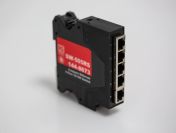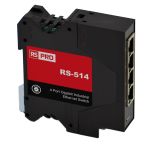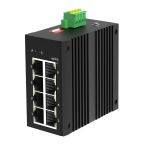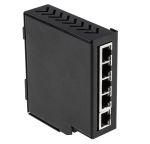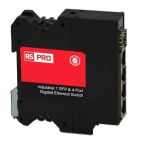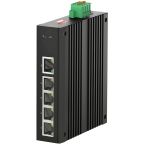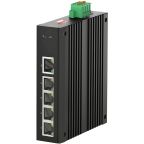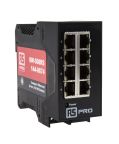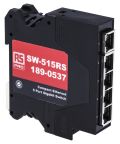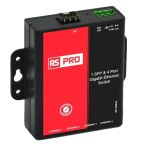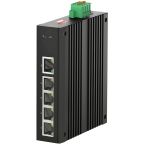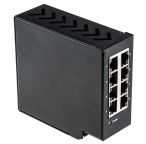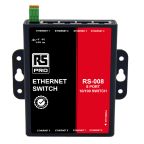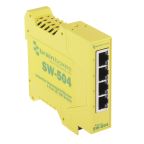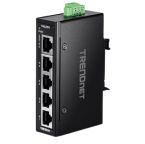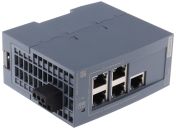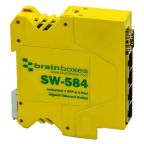Network Hubs
Network hubs, also known as Ethernet hubs or LAN hubs, connect multiple Ethernet devices to form a single network segment. They act as a central connection point, allowing for communication and data sharing between connected equipment.
These hubs come in various forms to suit different needs, including industrial hubs designed for harsh environments, and USB hubs that expand connectivity options for computers and other devices, offering enhanced durability and reliability.
How Network Hubs Work
Network hubs simplify connectivity, facilitating communication and data sharing across connected devices. Here's how they achieve this:
- Central Connection: Acting as a central point for connecting multiple Ethernet devices — such as computers, printers and servers — the hub creates a shared network segment where all connected devices can communicate with each other.
- Data Transmission: To facilitate communication and data sharing between any two devices on the network, the hub broadcasts data received from one device to all other connected devices.
- Expanding Connectivity: With a hub, you can expand the number of available Ethernet ports, allowing for the connection of more devices to your network than your router or switch might have ports for.
- Simple Setup: Network hubs are generally easy to set up and require minimal configuration. By simply connecting your devices to the hub's ports, they become part of the network.
Selecting the Right Network Hub or Switch
Network hubs and Ethernet switches are both used to connect multiple devices to a network, but they differ in how they handle data transmission and their overall efficiency. Understanding these differences is crucial for selecting the right device for your needs.
Port Count
The number of ports determines how many devices you can connect simultaneously. Network hubs typically have fewer ports (4 to 12), while Ethernet switches offer a wider range (8 to 48 or more). Choose a device with enough ports to accommodate your current needs and potential expansion.
Data Transfer Rate
This refers to the speed at which data can be transmitted through the hub or switch. Network hubs typically have lower data transfer rates compared to Ethernet switches. For high-bandwidth applications like video streaming or large file transfers, an Ethernet switch with a higher data rate is recommended. To maximize data transfer rates, consider using Cat 7 cables, which support higher bandwidths and faster speeds compared to older cable categories.
Protocol Compatibility
Ensure the hub or switch supports the necessary network protocols for your devices. Most modern devices support common protocols like Ethernet and Fast Ethernet. However, for specialized applications or newer devices, you might need a switch that supports Gigabit Ethernet or even PoE (Power over Ethernet). PoE switches can supply power to devices like IP cameras or VoIP phones through the Ethernet cable, eliminating the need for separate power adapters.
Environment
Consider the environment where the hub or switch will be installed. For industrial settings with harsh conditions, choose an industrial hub or a rugged Ethernet switch with features like extended temperature range, shock resistance and protection against dust and moisture. Additionally, proper cable management is essential in such environments to prevent damage to cables and ensure reliable operation.
Features and Benefits
Network hubs offer a range of features and benefits, making them a practical solution for expanding network connectivity and facilitating communication between multiple devices. These include:
- Multiple Device Connection: Connect numerous devices to a single hub.
- Energy Efficiency: Minimize power consumption for eco-friendly operation.
- Cost-Effectiveness: Expand network infrastructure quickly and affordably.
- Easy Access: Front-facing ports for convenient connectivity.
- Versatile Mounting: Wall and DIN rail mountable for flexible installation.
- Scalable Port Options: Available with 1 to 16 ports to suit various needs.
- Surge Protection: Safeguard connected devices from voltage surges.
Industry Applications of Network Hubs
Network hubs and Ethernet switches are vital components in various industrial sectors, enabling reliable communication and data transfer between devices in challenging environments. Their ability to connect multiple devices and withstand harsh conditions makes them essential for:
- Automation Industries: Industrial hubs play a crucial role in automation by connecting sensors, actuators and controllers, enabling seamless data exchange and real-time monitoring of automated processes.
- Energy industries: Rugged Ethernet switches are essential for reliable communication in the energy sector, connecting equipment in power plants, substations and renewable energy installations, even in harsh outdoor conditions.
- Machinery and robotics industries: Network hubs and Ethernet switches facilitate communication and control in robotics and machinery applications, connecting robots, CNC machines and other equipment for coordinated operation and data acquisition.
- Transportation industries: Industrial PoE switches are used in transportation systems to power and connect devices like surveillance cameras, traffic signals and communication systems, ensuring reliable operation and efficient traffic management.
Reliable Network Connectivity with Network Hubs and Switches
RS Australia is your trusted source for high-quality network hubs and Ethernet switches — as well as ethernet cables and network cable testers — to meet your internet and connectivity needs. We partner with leading brands like Schneider Electric and Siemens to provide durable and high-performing network hubs and industrial PoE switches. Whether you need to expand your network, connect devices in a harsh industrial environment or establish a robust communication system, we have the ideal solution.
By choosing RS Australia, you benefit from competitive pricing, fast delivery across Australia and exceptional customer service. We also offer various payment options and flexible delivery solutions to suit your needs. For detailed information on delivery services and costs, please visit our Delivery Information page today. Build a robust and reliable network with our high-quality network hubs and Ethernet switches — order from RS Australia today!
Popular Searches
Related links
- Network Switches
- StarTech.com Industrial Ethernet Switch
- WAGO 5 Port Ethernet Switch
- BALLUFF BNI Series Screw Mount Network Hub, 18 → 30V dc
- Schneider Electric ConneXium - Ethernet Series DIN Rail Network Hub, 24 V
- Ethernet Explained: Your Essential Guide to Choosing and Using Ethernet Cables
- Hirschmann Managed Switch 12 Port Ethernet Switch
- A Guide to Ethernet Cables
